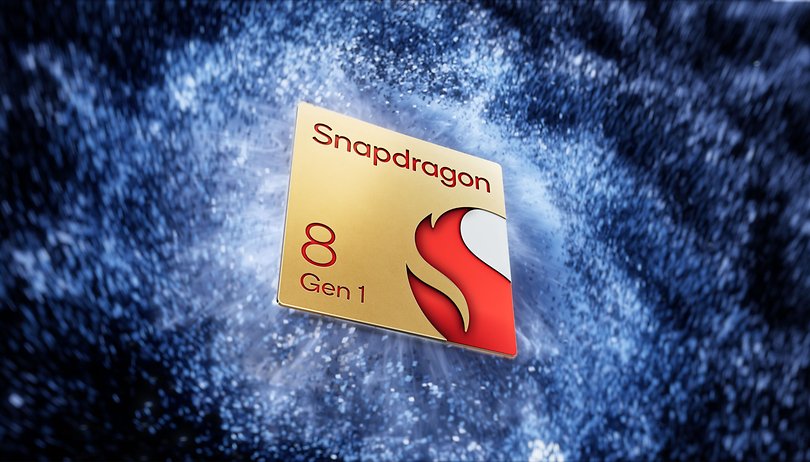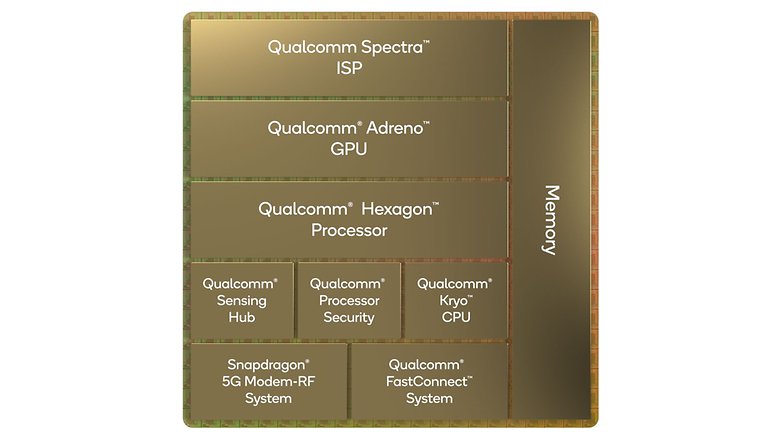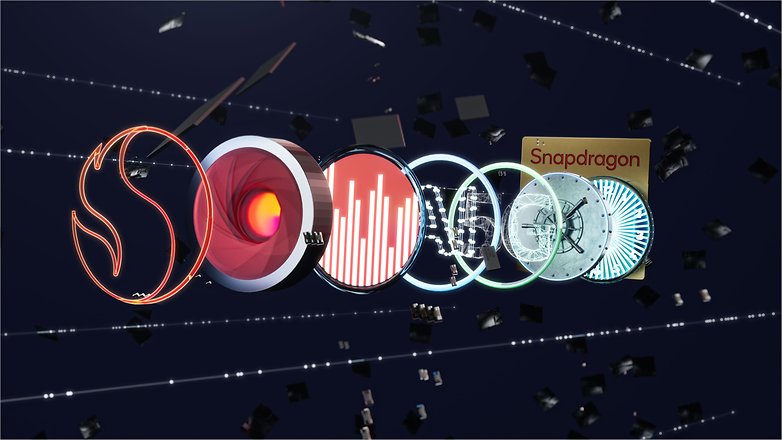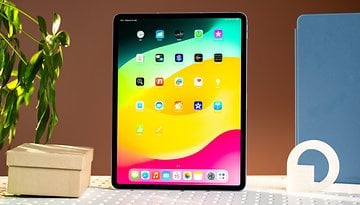Qualcomm Snapdragon 8 Gen 1 brings a new name to 2022 premium phones


At its traditional year-end conference, Qualcomm unveiled the next generation of its top-end processor. With a new naming scheme, the Snapdragon 8 Gen 1 succeeds the Snapdragon 888 as the brand's top-of-the-line SoC, which should equip the main releases in mobile phones in 2022.
TL;DR
- The Snapdragon 8 Gen 1 brings a new nomenclature and promises up to 30% higher performance in games.
- Image processing is compatible with sensors up to 200 megapixels and 18-bit color depth.
- First phones with the processor should be announced later this month.
After breaking the 835/845/855/865 sequence with the Snapdragon 888 processor, Qualcomm has changed its naming scheme again with the Snapdragon 8 Gen 1 – "8g1" throughout. The annual update to the US company's flagship processor lineup brings the expected improvements in CPU, GPU, AI and connectivity, plus a heavy investment in image processing.

New CPU architecture
As it happened with the Snapdragon 888, Qualcomm preferred to highlight the advances in AI and connectivity of the 8g1, but let's start with the CPU. The new Snapdragon retains the 1+3+4 core configuration, with one Cortex-X1 high-performance CPU, three Cortex-A710 intermediate cores, and four Cortex-A510 low-power cores.
The organization is similar to that used in the previous generation and is virtually the same that's used in rival MediaTek Dimensity 9000, with a slight advantage in processing speeds for the Taiwanese competitor, benefiting from TSMC's more advanced production process.
According to Qualcomm, the new CPU, along with Samsung's new manufacturing process, is able to offer up to 20% more performance than the Snapdragon 888, or a 30% reduction in consumption for the same workload. Part of the improvement is also explained by the use of the new ARMv9 architecture, which is more efficient in heavier tasks.

Turbocharged GPU
The new Adreno GPU - without a specific name, which for being exclusive to Qualcomm was never very useful for comparisons- was also updated, but without details about the number of cores or processing frequency.
At this point, Qualcomm adopted an Apple strategy, disclosing only performance numbers relative to the previous generation: 30% more processing or 25% more efficiency than the Snapdragon 888's Adreno 660 GPU.
Better Day or Night Photos
Perhaps the biggest highlight of the Snapdragon 8g1 is the Spectra image processing module (ISP) – also under a generic name – capable of processing up to 3.2 gigapixels per second. The core remains compatible with image sensors with up to 200 megapixels (or up to three sensors with 36 MP) but is now capable of a greater color depth by using the Spectra ISP. The core maintains support for image sensors up to 200 megapixels (or up to three sensors with 36 MP), but now supports greater color depth when working with sensor captures – the final file still has 10-bit definition (1 billion colors), both in video and stills.
The ISP has integrated computational photography features such as face detection, new autofocus techniques, and the option to apply night mode on the hardware level, which captures up to 30 images to generate the final photo. These changes should help close the gap in image processing quality between different manufacturers, provided they're implemented correctly, of course.

AI and 5G accelerated
The artificial intelligence part also received a boost, with the new generation of the Hexagon NPU (neural processing unit) that, according to Qualcomm, is up to four times faster on the Snapdragon 8g1 than on the 888. The performance increase can offer to the device more features that were previously made in the cloud (following the steps of Apple and Google), both for natural language processing (voice commands) as for scene recognition in photos and even the application of photographic filters.
The modem Snapdragon X65 – expands the connectivity capabilities of the X60 with a speed of up to 10 gbps for downloads (3 gbps for uploads), using features such as carrier aggregation and more 5G frequencies.
| Flagship 2022 | Flagship 2021 | The challenger | |
|---|---|---|---|
| Product |
Snapdragon 8 Gen 1
|
Snapdragon 888
|
MediaTek Dimensity 9000
|
| CPU | 1x ARM Cortex-X2 @ 3.0 GHz 3x ARM Cortex-A710 @ 2.5 GHz 4x ARM Cortex-A510 @ 1.8 GHz |
1x ARM Cortex-X1 @ 2.84 GHz 3x ARM Cortex-A78 @ 2.42 GHz 4x ARM Cortex-A55 @ 1.8 GHz |
1x ARM Cortex-X2 @ 3.05 GHz 3x ARM Cortex-A710 @ 2.85 GHz 4x ARM Cortex-A510 @ 1.8 GHz |
| GPU | "Adreno" | Adreno 660 | 10x ARM Mali-G710 |
| NPU / DSP | "Hexagon" | Hexagon 780 | MediaTek 4+2 colors |
| ISP | Qualcomm Spectra Triple 18-bit Up to 200 MP 8K30 / 4K120 video |
Qualcomm Spectra 580 Triple 14-bit Up to 200 MP Video 8K30 / 4K120 |
MediaTek Imagiq 790 ISP Triple 18-bit Up to 320 MP Video 8K30 / 4K120 |
| Modem | Snapdragon X65 10 Gbps (mmWave compatible) |
Snapdragon X60 7.5 Gbps (mmWave compliant) |
MediaTek 7 Gbps (no mmWave) |
| Memory RAM | LPDDR5-6400 4x 16-bit @ 3200 MHz (51.2 GB/s) |
LPDDR5X-7500 4x 16-bit @ 3750 MHz (60 GB/s) |
|
| Connectivity | Wi-Fi 6E Bluetooth 5.2 |
Wi-Fi 6E Bluetooth 5.3 |
|
| Samsung (4 nm) | Samsung 5LPE (5 nm) | TSMC N4 (4 nm) | |
Snapdragon 8 gen 1: Availability
The announcement of Snapdragon 8g1 serves as the kickoff for the avalanche of launches from major manufacturers throughout 2022. The first models equipped with the new SoC are expected as early as late 2021, with the announcement of models from Xiaomi and Motorola expected later this month.
As with the Snapdragon 888, Xiaomi not only announced that it will be the first manufacturer to sell a phone with the Snapdragon 8 Gen 1, but also released two videos on its social networks, including a teaser for the Xiaomi 12.
Among the brands announced by Qualcomm that should use the Snapdragon 8 Gen 1 are Honor, Lenovo/Motorola, Oppo/OnePlus, Realme, Sharp, Sony, Vivo/iQOO, Xiaomi/Redmi/Black Shark and ZTE/Nubia. The list should also gain the inclusion of Samsung, which should equip regional versions of the Galaxy S22 with the processor.
After the announcement of Dimensity 9000, all that remains now is to wait for the announcement of the new Exynos processor, whose highlight is the integration of AMD Radeon RDNA2 GPU. And of course, to see how the new generations handle the balance between performance, stability and heat dissipation.
Source: Qualcomm

















